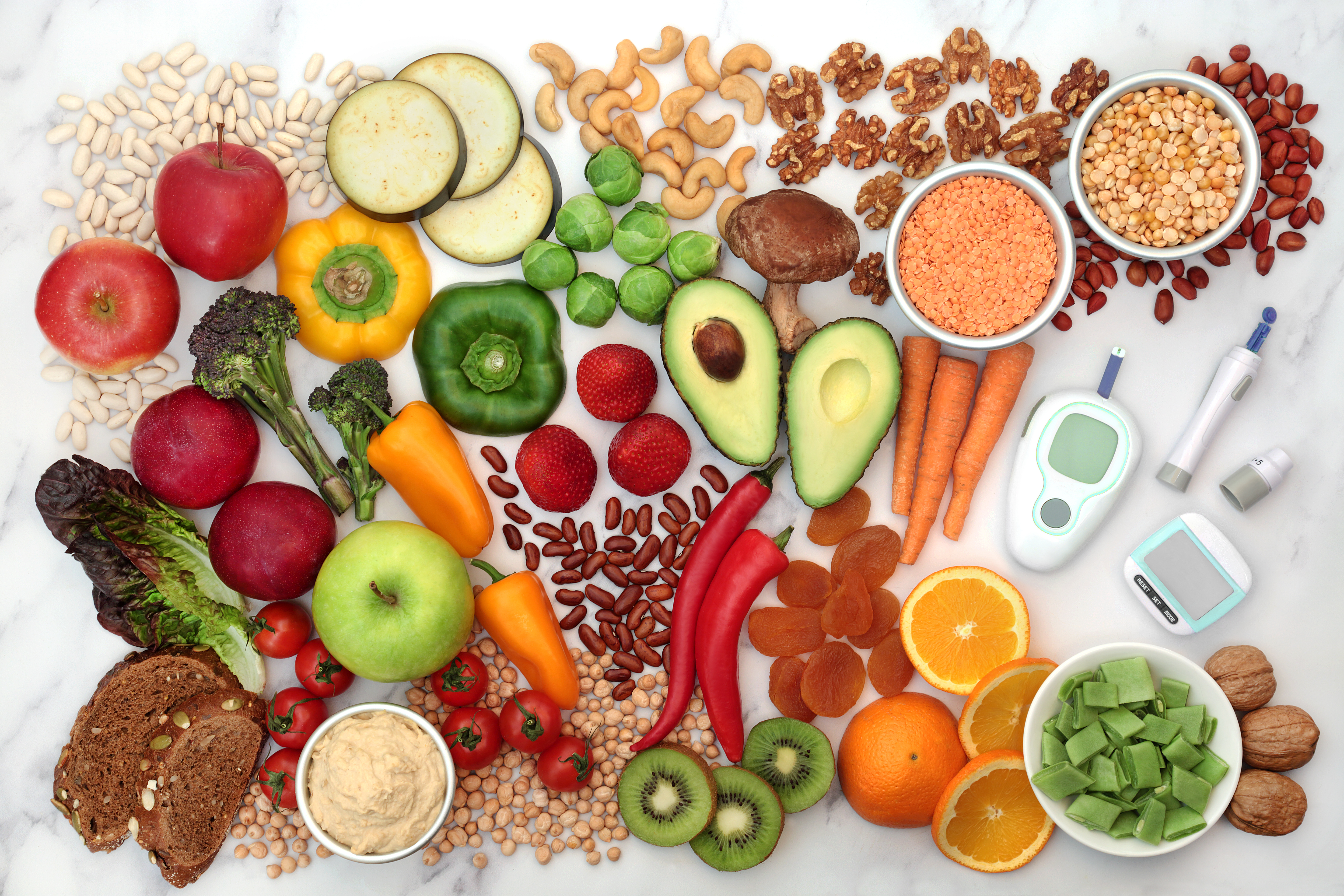Diabetes & Nutrition
Healthy eating for prediabetes and diabetes not only helps to manage your blood glucose (blood sugar), but it also helps you develop a better relationship with food. Making intentional food choices will assist you in meeting your health goals. It's not about one specific food or meal, but rather about maintaining a healthy eating pattern over time.
When you consume extra calories and carbohydrates, your blood sugar levels increase. If blood sugar is not controlled, it can lead to serious problems, including high blood sugar levels, known as hyperglycemia. If this high level persists for a prolonged period, it may result in long-term complications such as nerve, kidney, and heart damage.
You can maintain healthy blood sugar levels by making good food choices and monitoring your eating habits.

Diabetic Snacks
Diabetic snacks should contain a balance of carbs, protein and fat. Generally, a diabetic snack has 15-30 g of carbohydrates and around 100-200 calories. They should be eaten when blood sugar starts to drop to prevent hypoglycemia and, if you experience morning hypoglycemia, they can be eaten as an evening snack to prevent hypoglycemic events the next morning.
If you become hypoglycemic (your blood sugar gets low), take a fast-acting carb such as 4oz of juice, regular soda, D40 gel, glucose tablets, or candy or as directed by your physician. Once your low blood sugar is corrected, make sure you eat a meal or diabetic snack that contains protein and carbs within 30 minutes to prevent your blood sugar from dropping again.
Why Is Protein Important?
Protein helps stabilize blood sugar by slowing down how quickly carbohydrates are absorbed into the bloodstream. This can help prevent your blood sugar from spiking too high or dropping too quickly after eating carbohydrates. For this reason, eating protein with carbohydrates helps you go longer between meals without your blood sugar getting too low.
Choose whole grains (and other foods with fiber)
Fiber is important for managing blood sugar levels because it slows down how quickly you absorb carbohydrates. Fast acting, or rapidly absorbed carbs (such as juice or candy), are important when blood sugar is too low (hypoglycemia), but more slowly absorbed, fiber-containing carbs are best for meals and snacks to prevent high blood sugar spikes and to maintain stable blood sugar longer. Choose whole grains and eat vegetables every day to include more fiber in your diet.
Snack Ideas
- Cheese and whole grain crackers
- Pita chips (or veggies) and hummus
- Yogurt and berries
- Fruit and nuts
- Crackers and peanut butter
- ½ Sandwich
- Popcorn and cheese
- Granola with Greek yogurt
Protein foods to include with snacks
- Hard-boiled eggs
- Greek yogurt
- Cottage cheese
- Cheese
- Nuts
- Peanut butter
- Jerky
- Tuna or chicken salad
- Hummus (also contains carbs)
Carb Servings (about 15g carbs)
*Snacks should contain 1-2 carb servings or 15-30g carbs.
- ½ cup fruit
- 1 slice of bread or 1 tortilla
- 7-8 crackers
- 3 graham cracker squares
- 3 cups popcorn
- 1 small granola bar or soft baked fruit and grain bar
- ¼ cup granola
- 4 tablespoons hummus
- 1 cup milk
- 2/3 cup plain yogurt or sweetened with sugar substitute
Center for Diabetes & Nutrition Education
Learn about making informed food choices and developing healthy eating and physical activity habits with the team at Baptist Health's Center for Diabetes & Nutrition Education!
Recognized for excellence by the American Diabetes Associates since 1995, the Center for Diabetes and Nutrition Education has certified diabetes educators who are both registered nurses and registered dietitians. Our educators teach patients one-on-one and in small groups about all aspects of diabetes management, and certified insulin pump instructors provide insulin pump therapy. Special programs for those patients with gestational diabetes are offered.
5 Things We Do:
- Help you understand what is happening in your body when you have diabetes.
- Explore exercise options for your level of fitness/ability.
- Review how your medication works and makes sure you are taking it correctly.
- Instruct you on the correct amount of carbohydrate foods to eat.
- Discuss how to also integrate heart-healthy eating and low-sodium eating into a diabetes meal plan.
Classes Offered:
- Weight Loss for Life
- Pre-Diabetes
- Healthy Heart
- Hypertension
- Comprehensive Diabetes Education